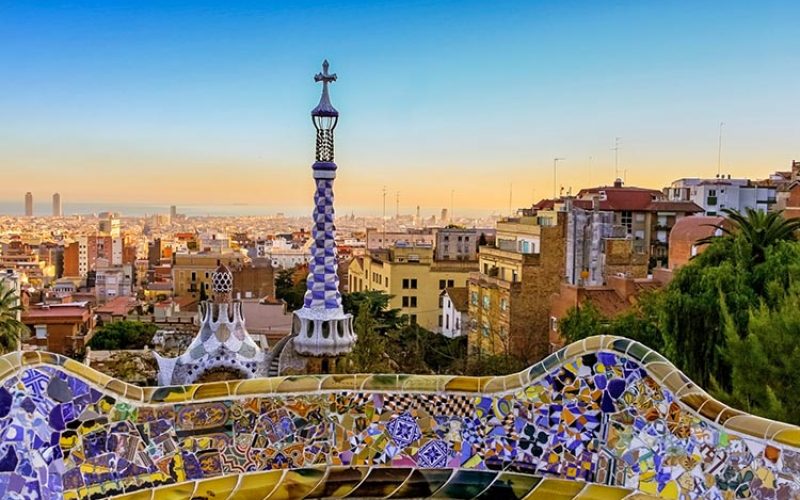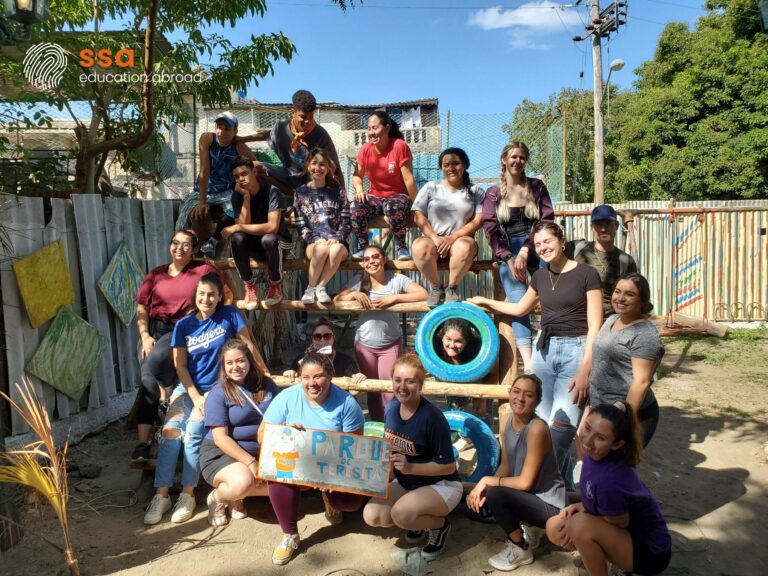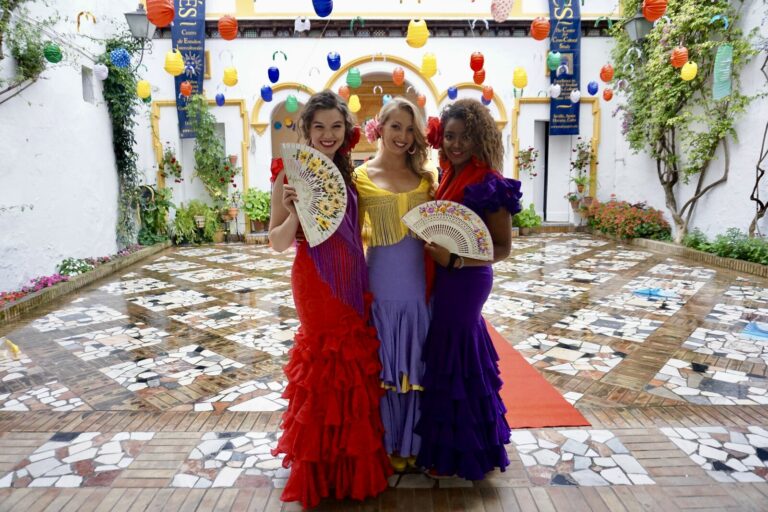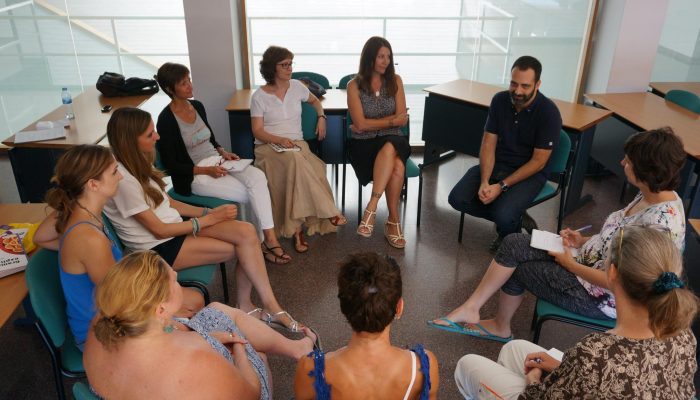Is Barcelona an excellent place to study abroad for students?
Barcelona has become a world-class destination in recent decades, and it’s not difficult to understand why. The city is full of culture, from well-known cuisine to Gaudi and Miró museums. I love its physical beauty, from its architecture to its setting between the Mediterranean sea and the Pyrenees mountains.
Barcelona is one of the most incredible cities globally, and it shows in the high numbers of visitors. Statista estimates that by 2019, the city was receiving around 19 million visitors annually.
The city’s Mediterranean lifestyle is undoubtedly a driving factor for trips to Barcelona from European cities to travelers from the Americas and Asia. A place that is chock-full of culture and has beautiful, sandy beaches? Imagine a day that includes beach volleyball and opera; a real possibility in the fantastic city of Barcelona.
How many international students are in Barcelona?
We have written before (20 Insider Tips for Studying in Barcelona) that 2,000 to 4,000 American students study in Barcelona in a typical year.
But what about other nationalities? Typically, Barcelona has around 20,000 international students in a given year in the higher education sector. Since students like to gather in the same places and look for similar experiences, there are ample opportunities to meet other young people and develop friendships.
What will life be like when I begin my Barcelona study abroad experience?
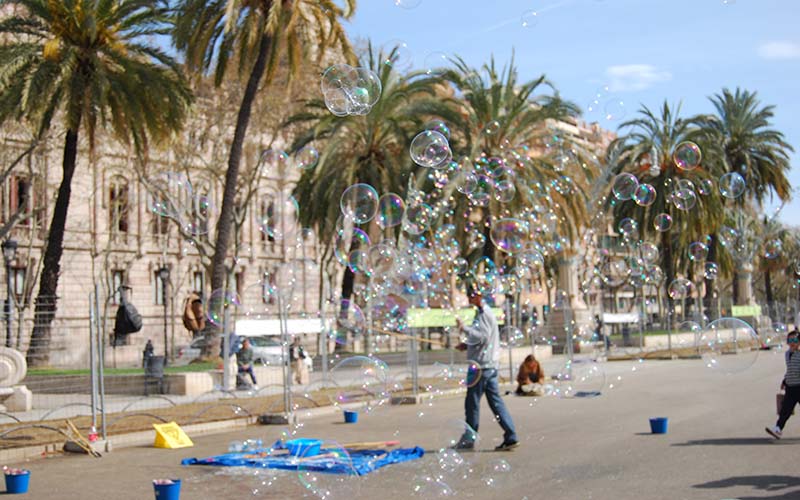
What a study abroad experience is like depends on many factors, namely you. Barcelona provides a backdrop – an urban, cosmopolitan environment – for your adventure. Barcelona is city streets, cafes, restaurants, public art, museums, “high” culture, education, mixing with a diverse population, multiple languages, and more.
You carve out how you want to experience all these traits, so everyone’s experience varies. The city also offers access to beaches and a Mediterranean / Southern European lifestyle, including delicious food.
The city is easy to navigate on foot and through public transportation. You can experience the gothic neighborhoods that date to Medieval times. And in a short distance, you walk through the splendors of turn-of-the-century (the 20th century, that is) boulevards with their palm trees and outdoor cafes.
Your housing will be a defining factor in shaping your Barcelona study abroad experience. Accommodation is expensive in large, international cities such as Barcelona. Spanish Studies Abroad offers both homestays and student residence housing in Barcelona.
Homestays provide essential gateways into the local culture, and they can be places to practice Spanish. Generally, homestays available to international students lie outside the city center. Hence, a commute time of up to an hour is realistic.
Student residences tend to be more expensive than living with a family but are generally more centrally located. Students have chances to meet other young people, and they spend less time commuting. In most cases, you share a room with another student (or more).
What do I need to know before studying abroad in Barcelona?
We invite you to take a look at our “tips” for studying in Barcelona. Spanish Studies Abroad provides a lot of information before departure to ensure you have covered the key points. The most important things tend to be what to pack, visa information, and understanding your destination.
Students are informal in Spain but, generally, a bit more formal in their dress than you find on US college campuses. Jeans and t-shirts are acceptable, as well as sweatshirts and sports jackets. You see fewer super casual clothing items such as yoga pants, flip flops, and baseball caps. What you do need in any European city are good shoes for walking on sidewalks and stones.
Visas are required for US visitors if their intended time in Spain is over 90 days. Check with your study abroad program or the Spanish consulates to ensure you have enough time to secure a visa. Remember that the first step to getting a visa is having a valid passport, so take care of that detail first.
Read what you can about Barcelona – or watch travel videos – so that you are ready to adjust to a new environment. Understand that it is a cosmopolitan, sophisticated urban setting with something for everyone, and plan on trying to get the most out of your time there.
What do I need to know when I start studying abroad in Barcelona?
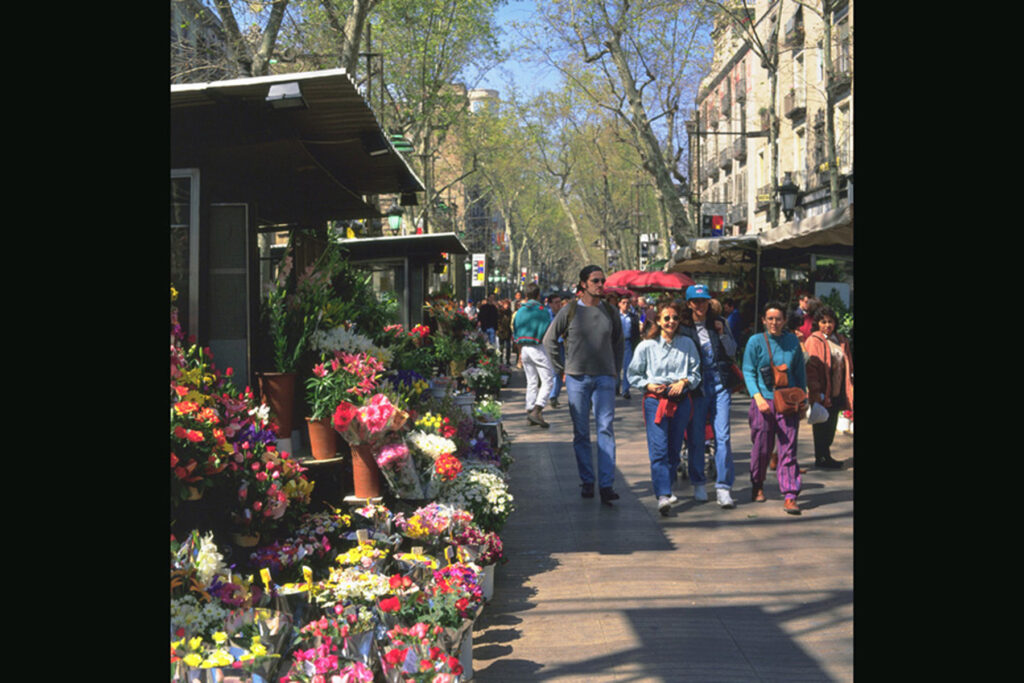
Be ready to interact with people from different backgrounds and get around a European city. Learn the essential train lines to go from your housing to your classes and other key destinations, such as the Rambla area at the heart of the city.
It is good to know about Catalonia’s politics, history, and realities of language (see below). You have a better chance of succeeding in another country if you have learned a lot about it. Many people from Barcelona and the Catalonia region don’t feel “Spanish” and might prefer political independence from Spain. Why is this? We encourage you to know why some feel that way through pre-departure reading (or, again, watching videos).
In Catalonia, they may speak more of their local culture than “Spanish Culture.” It’s important to note that they’ve been in a political union with Castille and Madrid for more than 500 years, so there are undoubtedly many things in common.
What do I need to know about the language or languages spoken in Barcelona?
It’s a question that seems so simple, but the answer is complex. People often find their identity in their preferred language. Barcelona is technically a Spanish city, but its first language is Catalán (Catalonian), NOT what we refer to as “Spanish.” Catalán is an entirely distinct Romance language from Spanish, the way French and Italian are.
Since Barcelona is part of Spain, “Spanish” (Castilian Spanish) is also widely spoken. Still, it’s a “second language,” though both are official languages. There are undoubtedly many immigrants from other parts of Spain in Barcelona who prefer Spanish (and may not even speak Catalán).
Where can I study abroad in Barcelona?
Keep in mind that Barcelona is a large, diverse, and cosmopolitan city. As such, your choices are pretty varied. If you’re an American university student, check with your college’s international education office to see if they have a program or what programs are accepted for credits there.
Spanish Studies Abroad’s Barcelona program works with three different educational institutions – Universitat Pompeu Fabra, Universitat Autònoma de Barcelona, and Elisava, a school for Art and Design.
Each of these universities offers content in English and Castilian Spanish (and the local Catalonian language) for students.
In addition, you will find that many professors at US universities take faculty-led groups to Barcelona and its environs.
Depending on what your needs are, there are many other options available for study in Barcelona. Adult language schools (not for credit), summer camps for youth, and colleges that offer post-secondary education. They offer courses in Business, Information Technology, Design, Filmmaking, and Hospitality Management, all in English.
What Can I Study during a Barcelona Study Abroad Experience?
The topics available to study are as varied as is higher education. Programs like the Universitat Autònoma de Barcelona’s study abroad offer higher education courses in History, European Studies, Politics, Economics, all areas of Business, Culture, Art, Language, and Communication.
Elisava offers international students courses in Art History, Fundamentals of Design, and practical areas of design such as packaging, visual merchandising, and industry.
The Universitat Pompeu Fabra is a comprehensive research university. Its offerings extend from the Humanities and Letters to STEM and interdisciplinary approaches to crucial global issues. Students need to research what courses are offered in English (or Castilian Spanish) in a given semester. Still, there are extensive offerings in all disciplines.
Do Barcelona Universities Teach in English?
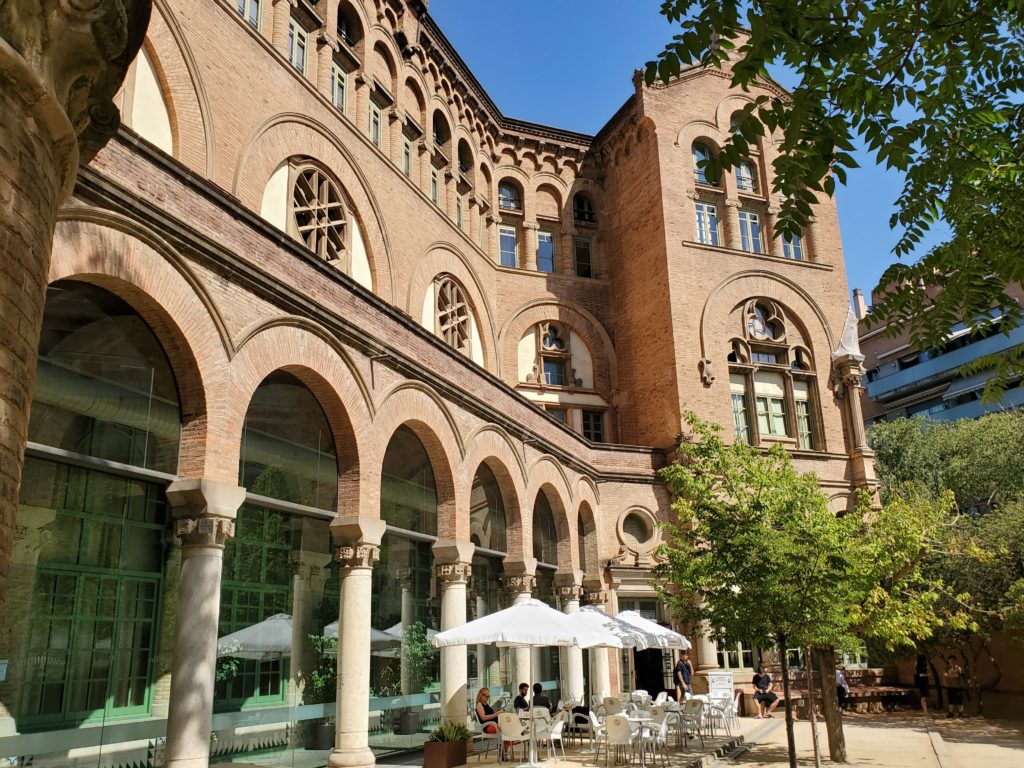
The standard language for the institutions that cater to the local population is Catalán, with some courses in Castilian Spanish.
However, as we have noted, the Universitat Pompeu Fabra offers some courses in English that include for its local population. Elisava offers courses for international students only in English. And the Universitat Autònoma de Barcelona’s study abroad campus offers mostly English-medium courses, with a few in Castilian Spanish.
In recent years, new colleges and universities have opened that focus on international students with courses in English. Many of these are Business and Hospitality Management schools.
Is studying abroad in Barcelona expensive?
In general, studying abroad requires having an ample amount of financial resources. Western Europe is generally more expensive than most places in the USA and Canada, with certain exceptions like New York and San Francisco.
According to Expatistan.com, Barcelona is the most expensive city in Spain. Much of that comes down to the cost of housing because it is an attractive place to live. However, in their comparison of 54 Western European cities, Barcelona was 39th, which means that Spain, in general, is less expensive than countries like the United Kingdom, France, and Germany.
You can make your study abroad experience in Barcelona more affordable by walking more and eating out less. Consider staying with a homestay (instead of a private residence) and focusing on local activities instead of constant travel on the weekends.
Can I Work in Barcelona while I’m Studying Abroad?
As an American student, you cannot take on official employment in Spain during your study abroad. You’ll be entering either on a visa waiver (for programs of under 90 days) or a student visa (for programs of more than 90 days), and neither status allows employment.
Students from the European Union have working rights in Spain, but North American students do not. Some students find some informal work tutoring friends in English for an hour or two, but regular employment is not permitted.
Is it Castilian Spanish or Catalán?
If you’re still confused on this topic, keep in mind that these are two distinct romance languages. What we call “Spanish” is Castilian Spanish (it originates in the Kingdoms of Castille). If you’ve studied Spanish, you will likely only understand occasional words in Catalán, the predominant language in Barcelona.
Can I Travel While I’m Studying in Barcelona?
Yes!. Barcelona is close to France and is well-connected to Europe through low-cost airlines and train networks.
We don’t recommend that you spend every weekend checking off a bucket list item. Yes, Oktoberfest in Munich is fun, but you don’t want to miss out on what Barcelona has to offer. Take day trips to other sites in Catalonia such as Girona, the Priorat wine region, Sitges and Andorra.
You can make weekend train trips to Southern France or other parts of Spain such as Madrid, Zaragoza, the Basque Country, and Valencia.
What Our Students are Saying about studying in Barcelona
My experience with Spanish Studies Abroad was perfect for me because of the group’s intimate size. It let us get to know each other personally and helped us become close with our program director, who would help us with anything. She made restaurant recommendations, doctor appointments and informed us of events in Barcelona that we would not have come across otherwise.
Alexis Morillo, Ithaca College
I wish I could do it all over again!
Daley ElDorado, University of Nebraska
I began to take advantage of my experience by going to more places in Barcelona, which helped me improve tremendously with my Spanish.
Elizabeth Collins, Wartburg College
The Best Barcelona Study Abroad Experience
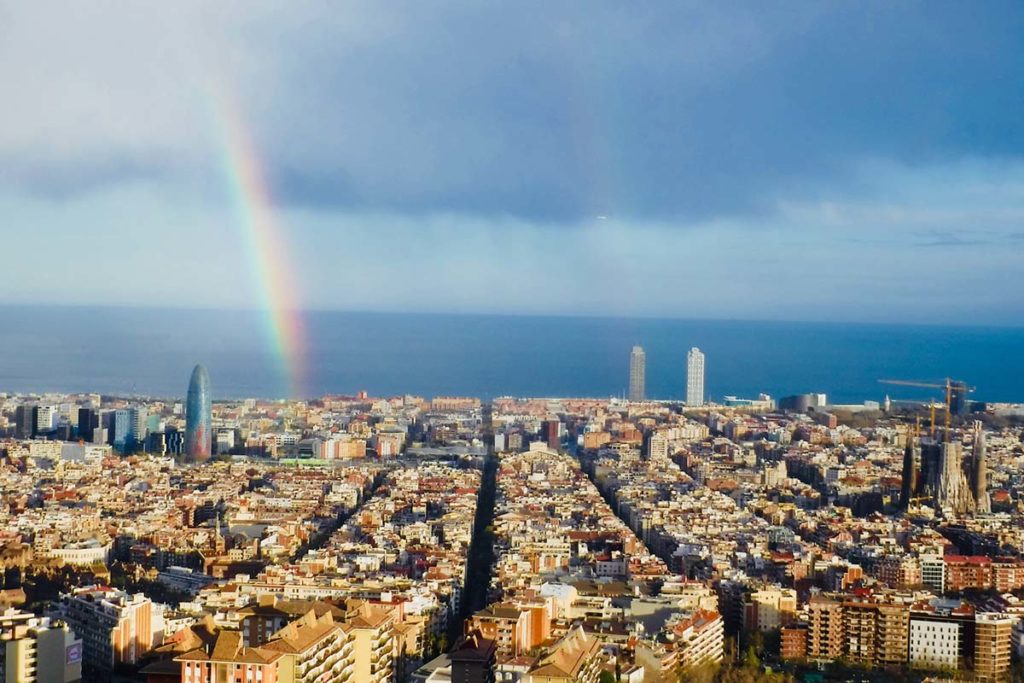
All study abroad destinations are what you make of them. Barcelona certainly provides an environment for an experience of a lifetime. You can take courses in English, but you can certainly improve your Spanish with locals who will practice with you.
Few cities have the beautiful urban design that you find in Barcelona, and North Americans can revel in its walkability, something we don’t often have. The city is a meeting point for many cultures, with a rich cultural heritage and a Mediterranean lifestyle. Encounter art and natural beauty in Barcelona, as well as little violent crime.
Navigate its historic streets, revel in its culture, and taste its delicious cuisine. And, if you like, check out its well-known nightlife. Barcelona is unique, and memorable experiences await you there.


